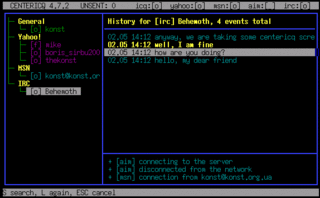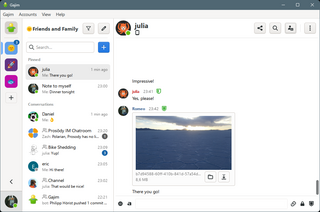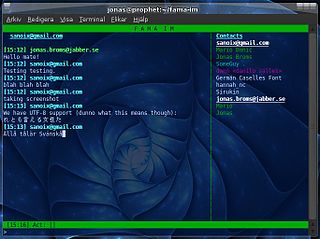
Internet Relay Chat (IRC) is a text-based chat system for instant messaging. IRC is designed for group communication in discussion forums, called channels, but also allows one-on-one communication via private messages as well as chat and data transfer, including file sharing.
ICQ New is a cross-platform instant messaging (IM) and VoIP client. The name ICQ derives from the English phrase "I Seek You". Originally developed by the Israeli company Mirabilis in 1996, the client was bought by AOL in 1998, and then by Mail.Ru Group in 2010.

Instant messaging (IM) technology is a type of online chat allowing real-time text transmission over the Internet or another computer network. Messages are typically transmitted between two or more parties, when each user inputs text and triggers a transmission to the recipient(s), who are all connected on a common network. It differs from email in that conversations over instant messaging happen in real-time. Most modern IM applications use push technology and also add other features such as emojis, file transfer, chatbots, voice over IP, or video chat capabilities.

ChatZilla is an IRC client that is part of SeaMonkey. It was previously an extension for Mozilla-based browsers such as Firefox, introduced in 2000. It is cross-platform open source software which has been noted for its consistent appearance across platforms, CSS appearance customization and scripting.
Trillian is a proprietary multiprotocol instant messaging application created by Cerulean Studios. It is currently available for Microsoft Windows, Mac OS X, Linux, Android, iOS, BlackBerry OS, and the Web. It can connect to multiple IM services, such as AIM, Bonjour, Facebook Messenger, Google Talk (Hangouts), IRC, XMPP (Jabber), VZ, and Yahoo! Messenger networks; as well as social networking sites, such as Facebook, Foursquare, LinkedIn, and Twitter; and email services, such as POP3 and IMAP.
Messenger was an instant messaging and presence system developed by Microsoft in 1999 for use with its MSN Messenger software. It was used by instant messaging clients including Windows 8, Windows Live Messenger, Microsoft Messenger for Mac, Outlook.com and Xbox Live. Third-party clients also connected to the service. It communicated using the Microsoft Notification Protocol, a proprietary instant messaging protocol. The service allowed anyone with a Microsoft account to sign in and communicate in real time with other people who were signed in as well.

Pidgin is a free and open-source multi-platform instant messaging client, based on a library named libpurple that has support for many instant messaging protocols, allowing the user to simultaneously log in to various services from a single application, with a single interface for both popular and obsolete protocols, thus avoiding the hassle of having to deal with a new software for each device and protocol.

Extensible Messaging and Presence Protocol is an open communication protocol designed for instant messaging (IM), presence information, and contact list maintenance. Based on XML, it enables the near-real-time exchange of structured data between two or more network entities. Designed to be extensible, the protocol offers a multitude of applications beyond traditional IM in the broader realm of message-oriented middleware, including signalling for VoIP, video, file transfer, gaming and other uses.
climm is a free CLI-based instant messaging client that runs on a wide variety of platforms, including AmigaOS, BeOS, Windows, OS X, NetBSD/OpenBSD/FreeBSD, Linux, Solaris, HP-UX, and AIX.

Kopete is a multi-protocol, free software instant messaging client released as part of the KDE Software Compilation. Although it can run in numerous environments, it was designed for and integrates with the KDE Plasma Workspaces. Kopete was started because ICQ blocked Licq from their network in 2001. According to the original author, Duncan Mac-Vicar Prett, the name comes from the Chilean Spanish word copete, meaning "a drink with your friends". Kopete has been nominated for multiple awards. The designated successor is KDE Telepathy from the KDE RTCC Initiative.

Centericq is a text mode menu- and window-driven instant messaging interface that supports the ICQ, Yahoo!, AIM, MSN, IRC, XMPP, LiveJournal, and Gadu-Gadu protocols.

Damn Small Linux (DSL) is a discontinued computer operating system for the x86 family of personal computers. It is free and open-source software under the terms of the GNU GPL and other free and open source licenses. It was designed to run graphical user interface applications on older PC hardware, for example, machines with 486 and early Pentium microprocessors and very little random-access memory (RAM). DSL is a Live CD with a size of 50 megabytes (MB). What originally began as an experiment to see how much software could fit in 50 MB eventually became a full Linux distribution. It can be installed on storage media with small capacities, like bootable business cards, USB flash drives, various memory cards, and Zip drives.

A botnet is a group of Internet-connected devices, each of which runs one or more bots. Botnets can be used to perform Distributed Denial-of-Service (DDoS) attacks, steal data, send spam, and allow the attacker to access the device and its connection. The owner can control the botnet using command and control (C&C) software. The word "botnet" is a portmanteau of the words "robot" and "network". The term is usually used with a negative or malicious connotation.
A BNC is a piece of software that is used to relay traffic and connections in computer networks, much like a proxy. Using a BNC allows a user to hide the original source of the user's connection, providing privacy as well as the ability to route traffic through a specific location. A BNC can also be used to hide the true target to which a user connects.

BitlBee is a cross-platform IRC instant messaging gateway, licensed under the terms of the GNU General Public License.

Gajim is an instant messaging client for the XMPP protocol which uses the GTK toolkit. The name Gajim is a recursive acronym for Gajim's a jabber instant messenger. Gajim runs on Linux, BSD, macOS, and Microsoft Windows. Released under the GPL-3.0-only license, Gajim is free software. A 2009 round-up of similar software on Tom's Hardware found version 0.12.1 "the lightest and fastest jabber IM client".
The following tables compare general and technical information between a number of notable IRC client programs which have been discussed in independent, reliable prior published sources.

Jitsi is a collection of free and open-source multiplatform voice (VoIP), video conferencing and instant messaging applications for the Web platform, Windows, Linux, macOS, iOS and Android. The Jitsi project began with the Jitsi Desktop. With the growth of WebRTC, the project team focus shifted to the Jitsi Videobridge for allowing web-based multi-party video calling. Later the team added Jitsi Meet, a full video conferencing application that includes web, Android, and iOS clients. Jitsi also operates meet.jit.si, a version of Jitsi Meet hosted by Jitsi for free community use. Other projects include: Jigasi, lib-jitsi-meet, Jidesha, and Jitsi.

Fama IM is a free software instant messaging client for Linux and Unix that supports the use of multiple instant messaging protocols.

Ayttm is a multi-protocol instant messaging client. It is the heir of the EveryBuddy project.













